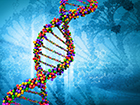
You may not realize it, but for years scientists considered the vast majority of our DNA - about 98% - as "junk" protein, since these sequences don't encode genes and were assumed to do nothing.
But that idea is being challenged by hundreds of researchers from a revolutionary international project called ENCODE, which stands for Encyclopedia of DNA Elements.
Their studies over the past five years suggest that more than 80% of the human genome is used for something important in keeping us healthy.
This group of non-coding DNA elements may enhance, promote, and regulate the massive, precise interworkings of cellular function. They can determine whether our proteins end up working properly, which is crucial in cells.
Studies are now pointing to genetic diseases that originate near or within these non-coding DNA sequences. For example, a rare brain disorder called Ravine encephalopathy causes severe anorexia in infants. It's due to a defect in a non-coding DNA sequence that leaves neurons unstable and degenerates the brain's white matter.
Beyond helping us understand that particular disease, the significance of ENCODE's results is that it takes us a step beyond the human genome project which first laid out the genes. Now, after studying 150 different cell types, ENCODE defines and explains the roles of our genes, revealing the marvelous complexity of the human genome that can signal 20,000 genes at the exact time and location to allow a fetus to develop normally.
The ENCODE project provides a rich source for many more years of excitiing research.
More Information
ENCODE Project Writes Eulogy for Junk DNA
Nice summary in Science about the co-publication of 30 manuscripts containing results and analysis from the ENCODE project.
The ENCODE Project: ENCyclopedia Of DNA Elements
The National Human Genome Research Institute's website on the ENCODE project.
National Human Genome Research Institute
This is the website of the National Human Genome Research Institute, which was established in 1989 as the National Center for Human Genome Research to carry out the role of the National Institutes of Health (NIH) in the International Human Genome Project.' The website of the Institute has extensive resources and explanations of the human genome and the latest in understanding human disease at the gene level. A wonderful resource!
Resources for Students
Wonderful resource page for students from the National Human Genome Research Institute with current news and information on genomic sciences.
Under three layers of junk, the secret to a fatal brain disease
Interesting article about Ravine encephalopathy and the scientists who found the related gene.